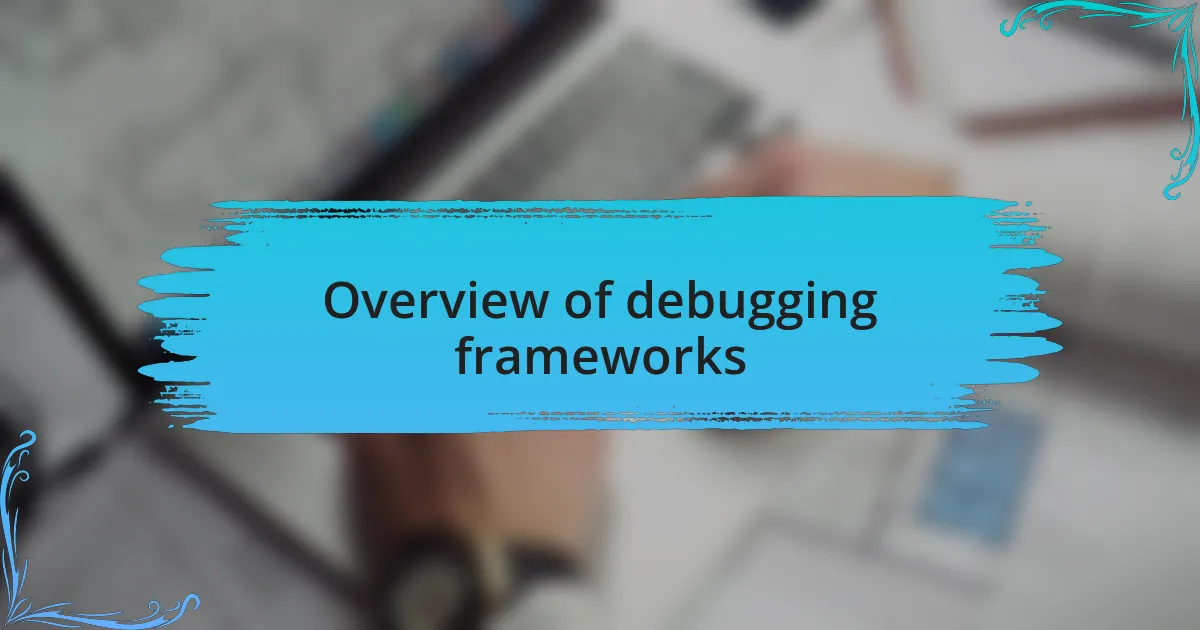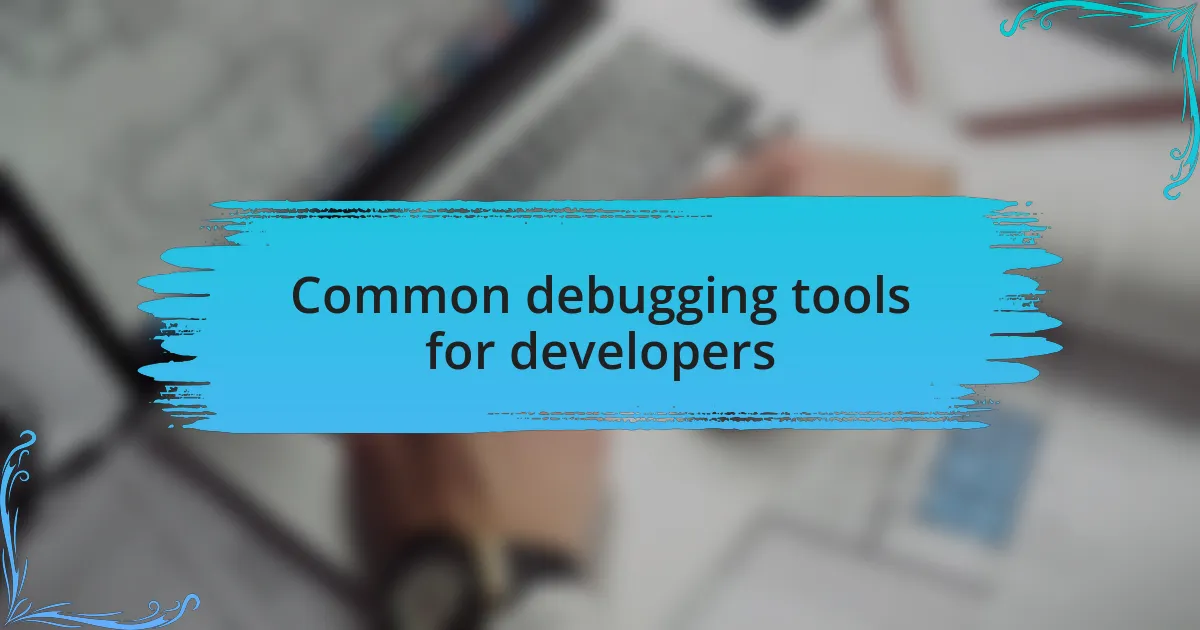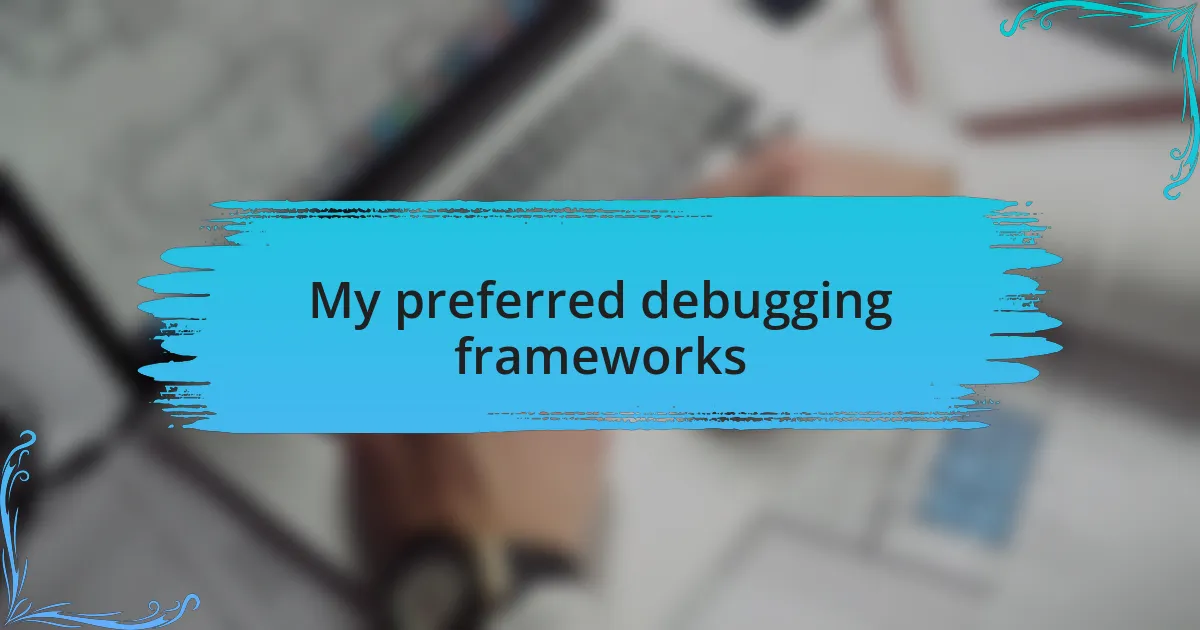Key takeaways:
- Debugging frameworks streamline error identification and resolution, while also enhancing coding skills and understanding.
- Common tools like Chrome Developer Tools and Visual Studio Code debugger greatly improve efficiency and real-time debugging capabilities.
- Systematic isolation of problems and effective logging are critical techniques for successful debugging.
- Community resources, such as Stack Overflow, can provide invaluable support and solutions when facing challenging errors.

Overview of debugging frameworks
Debugging frameworks are essential tools in the developer’s toolkit, designed to streamline the process of identifying and fixing errors in code. I vividly remember a time when I was struggling with a particularly elusive bug in a web application. It was frustrating until I utilized a framework that not only guided me in pinpointing the issue but also provided context on how it related to the rest of my code. Isn’t it incredible how having the right tool can turn a stressful situation into a learning experience?
These frameworks often come with a host of features, such as breakpoints and stack traces, to help developers track down problems efficiently. I often reflect on my early days of coding—back then, debugging felt like searching for a needle in a haystack. However, with the integration of advanced debugging frameworks, I found that my focus shifted from simply resolving issues to understanding the underlying logic in my code more deeply. Have you ever considered how a comprehensive framework can aid not just in fixing errors but also in enhancing your coding skills?
I’ve also discovered that different frameworks cater to various programming languages and environments, making it crucial to choose one that aligns with your project. For instance, when I transitioned from JavaScript to Python, the debugging frameworks I relied on had distinct features that not only improved my workflow but also helped me adapt more quickly. The choice of a debugging framework can significantly impact your efficiency—how do you determine which one is the right fit for your development process?

Common debugging tools for developers
Common debugging tools for developers come in various forms, each tailored to meet specific needs. For instance, when I first started using Chrome Developer Tools, I was blown away by how it allowed me to inspect elements and debug JavaScript directly in the browser. Have you ever felt the rush of excitement when you realize you can make real-time changes to your code and immediately see the results? It’s such a game-changer.
Another tool I have grown fond of is the Visual Studio Code (VS Code) debugger. Its interactive breakpoint feature has saved me countless hours. I remember working on a project where complex asynchronous calls were causing havoc, and stepping through the code line by line helped me unravel the chaos. The satisfaction of finally seeing my application perform as expected was truly fulfilling; it made the effort feel worthwhile.
Don’t overlook the importance of error tracking tools like Sentry or Rollbar. Integrating such tools in my projects has transformed my approach to monitoring live applications. In one instance, I received an alert at 3 AM about a critical error affecting users. I jumped on it immediately, and the insights provided helped me address the issue swiftly. Isn’t it comforting to know that even in the wee hours, technology can make debugging proactive rather than reactive?

My preferred debugging frameworks
One of my all-time favorite debugging frameworks is React Developer Tools. I remember the first time I utilized it; I was fascinated by its ability to visualize component hierarchies. It was like peering into the inner workings of my app, revealing the state changes at every level. Have you ever experienced that clarity moment when you realize what went wrong? It’s almost magical.
I often find myself relying on Redux DevTools when managing state in my applications. This tool is invaluable for tracking actions and state changes. There was one instance when a particularly stubborn bug was traced back to a missing action dispatcher. As I reviewed the state tree, I felt a wave of relief wash over me when I finally pinpointed the culprit. Seeing how all the pieces fit together is a rewarding part of the debugging process.
Another framework I’ve come to appreciate is Postman for API debugging. It’s so much more than just a tool; it has become an integral part of my workflow. I recall a challenging day where I needed to test multiple endpoints for a new feature. Armed with Postman, I could easily simulate requests and inspect responses, and the sense of accomplishment was palpable when everything worked seamlessly. Have you ever had that exhilarating moment when a feature you spent hours perfecting finally interfaces perfectly with the backend?

Techniques for effective debugging
When debugging, one of the key techniques I always rely on is systematic isolation of problems. I remember a particularly complex project where a minor bug was causing a major feature to fail. By breaking down the problem into smaller components and testing each one individually, I could quickly identify the offending code. Have you ever taken a step back and found that a seemingly simple issue was hidden in plain sight?
Logging is another practice I find indispensable during debugging. I developed a habit of sprinkling console.log statements throughout my code to track values at various stages. There was a project where I used logging to trace the path of a variable. That moment when I uncovered an unexpected value – it was like connecting the dots of a puzzle. Don’t you think that sometimes the smallest details lead to the biggest breakthroughs?
Additionally, I’ve discovered that leveraging community resources, like Stack Overflow, can significantly expedite the debugging process. There was a time when I felt stuck on a particularly tricky error message. A quick search on the platform led me to someone who had faced the same issue, and their solution was a game changer. Engaging with others’ experiences can be a real lifeline, wouldn’t you agree?